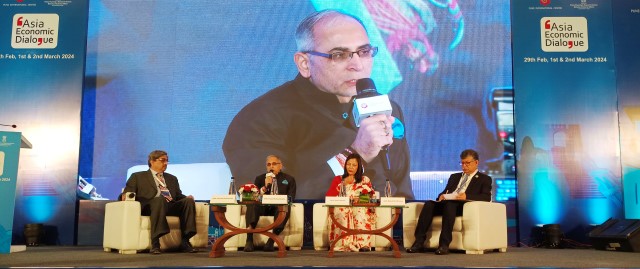
PUNE: International Cooperation and better economic integration of South East Asian Nations key to mitigating geo-economic Challenges in an era of flux opined various experts at the inaugural session of the 8th Asia Economic Dialogue jointly organized by the Ministry of External Affairs and Pune International Center here in Pune.
The inaugural session on the theme ‘Promoting Economic Integration in South Asia’ was chaired by Amb. Gautam Bambawale, Convenor, AED 2024, former Indian High Commissioner to Pakistan and former Ambassador to China and Bhutan. Panelists in this session included Amb. Vinay Mohan Kwatra, Foreign Secretary, Government of India, along with Amb. Sewa Lamsal, Foreign Secretary, Nepal, and Amb. Masud Bin Momen, Foreign Secretary, Bangladesh.
Dr. S.Jaishankar, External Affairs Minister, Government of India in a video address said that this edition of Asia Economic Dialogue focuses very appropriately on the Geoeconomic challenges of our times. Today these fall into three categories. One is the supply chain challenge created by the globalization era, the second is a technology challenge which grows by the day given our reliance on it for more aspects of our daily life and the third is the challenge of concentrations stemming from the nature of globalization. These three phenomena are coming together particularly impact fully when considering the evolution of critical and emerging technologies. To create a safer, secure, and cooperative world, we need greater international cooperation.
He added that we must build deep national strengths during the Amrit Kaal that will drive the transition towards becoming a developed economy. This is the vision of the Modi Government and our initiatives and programs of the last decade are aimed at this very end.
Amb. Vinay Mohan Kwatra Foreign Secretary, Ministry of External Affairs, Government of India said that conflicts and associated disruptions require strong mitigation by each country. But Geo Economics in many ways also presents a set of opportunities especially for India. When globally the countries are looking for reliable destinations for supply chains, market access, and capital looking for destinations which can offer strong returns on equity, this has benefitted India. Post Covid growth patterns tell a story and it is not just of numbers. Combined them with crucial matrices and perception of India and how it translated into evidence and the strongest evidence comes from FDI flows, a large chunk has post covid. All this comes together in a package that presents a picture of strength, hope and optimism, a picture of evidence-based growth that is not only national but where the international business community sees a lot of hope.
Amb. Seva Lamsel foreign secretary, Nepal said that COVID-19 and conflicts posed difficult times and hampered landlocked economies like Nepal. We had sluggish growth then but now our economy is gaining momentum due to reforms and stringent monetary policy. The energy sector, agriculture, and tourism are in focus. Also, macroeconomic indicators are good and the economy is on the right track.
Amb. Masud Bin Momen, foreign secretary, of Bangladesh, said that intra-regional trade in South Asia is one of the lowest around 5 percent. Improving connectivity not just physical but ancillary services like customs and others and connecting the dots will create a lot of potential for regional cooperation.
Dr. Raghunath Mashelkar, President PIC in his opening remarks said that this is the 8th Asia Economic Dialogue. PIC has become India’s leading policy think tank with strong programs.
